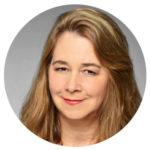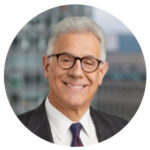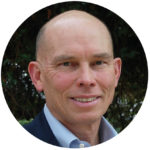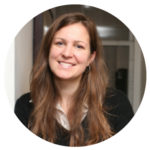Top Story
Are You Getting the Most Out of Your ULI Membership?
Are You Getting the Most Out of Your ULI Membership?
This week we are happy to have four contributing industry leaders share their thoughts about their community; about our world. On one of the many webinars I was on this past week, I heard a phrase that stuck with me – perhaps this virus will teach us, among many things, that we must all sacrifice for the collective good.
Wishing you a thoughtful week.
Cindy McSherry | Executive Director | ULI Chicago
__________________________________________________
Tales From the Front Line | May 11, 2020
 MARY LUDGIN
MARY LUDGIN
Senior Managing Director & Director Global Investment Research | Heitman LLC
This was a big week for me. Self-inflicted. I had said yes to three speaking engagements without paying attention to the fact that they would be bunched together on three consecutive days. Three slightly different takes on the question of what the future will be. To prepare, I read emails I had flagged but hadn’t gotten to in the daily email triage. I listened to podcasts about the Bubonic Plague and how it brought down feudalism. I meant to delve deeper into the Spanish Flu epidemic of 1918 and 19, hoping to reconcile how the quarantines and school closures of that pandemic gave way to the intense urbanization of the Roaring 20s. I reviewed charts of time-series data going back 30 years to the recession of 1990-91, at the start of my career, the Tech Bust Recession of 2001 and, of course, the big one, the Global Financial Crisis (GFC) of 2007-09. The fact that the two most recent downturns– the GFC and the one we’re in now — were monstrous, existential catastrophes made me wonder if globalization is doing to the economy what climate change is doing to the weather – intensifying events like hurricanes, thunderstorms, and typhoons. The net result is greater scope, greater damage, longer recovery times.
A few thoughts sparked by my reading and thinking:
First, my process included a morning in which I did not look at incoming email. I read only things I had saved for a moment when I could focus on them. It was liberating.
Second, I’m not convinced that this pandemic will cause spatial patterns to deviate sharply from prior trends. But it will accelerate ones in motion before we knew the term COVID. Census data show that older Millennials, ages 35-39, were leaving center cities for suburban settings in 2018 and 2019. This makes sense. Suburban communities accommodate families well. At the same time, in-migration to center cities by 20-35 year olds was rising. Will COVID change that in-migration? I don’t think so.
Finally, Deborah Tannen, a professor of linguistics at Georgetown, wrote recently that COVID-19 has brought some people “comfort in absence versus togetherness. Some will seek that” I’m sure that’s true. This stealthy virus has scared us all. That fear will stay with some people for a long time, causing many to seek environments that they can control. For some, that will mean working from home permanently. For me, it is just the opposite. I can’t wait for confirmation that I’m not taking undue risk during my 20-minute commute on the Green Line, heading back to the office.

STEPHEN B. FRIEDMAN, FAICP, CRE
President | SB Friedman Development Advisors | Chicago, IL
 CHARLES A. LONG
CHARLES A. LONG
Principal | Junction Properties &
Former City Manager | Oakland, CA
Post COVID: Pillars of Community Renewal
For US cities it is the best of times and the worst of times. Urban metabolism from technology jobs and investment has been high, with dramatic revitalization of cities that were once hollowed out during the 60’s, 70’s and 80’s.
However, the COVID-19 crisis has revealed systemic flaws that highlight the dark underside of that current vitality. We suddenly realize that “essential” workers – from the grocery clerk, postal worker, garbage collector, nurse, fire fighter, EMS driver, and physicians are bearing a disproportionate burden. Many of these “essential” workers are relatively low paid, sometimes below the “living wage” of $15 per hour; without benefits and living in communities where they and their neighbors lack affordable housing, adequate health care, food access, and employment. COVID-19 has highlighted systemic challenges to our economic and social vitality that must be addressed in the public, private and not-for-profit realms if our communities hope to overcome them. Our systems have failed large segments of our communities while those often considered important “movers and shakers” are able to carry-on almost without missing a beat.
The challenges are numerous across the economic and social spectrum and they need to be addressed comprehensively as systems:
The development community and ULI members can greatly contribute to addressing these issues. Our work is often framed in the realms of buildings, community facilities, and infrastructure, including residential, retail, commercial, hospitality, and industrial land use types. They are typically project specific (even if sometimes on a very ambitious scale). These problems however require system-level response and planning that must be led by the public sector collaboratively with the private, philanthropic, not-for-profit and civic sectors to address the gaps comprehensively and substantively. Planning is required at the system level and must be geographically comprehensive. Execution involves everyone.
Nationally, a webinar series is being proposed to ULI. Locally, ULI can be part of convening a new partnership between the public, private, philanthropic, not-for-profit, and civic communities to begin to address these failures at the highest and most comprehensive level.
 MOLLY EKERDT
MOLLY EKERDT
Vice President | The Preservation of Affordable Housing, Inc.
Like many Chicagoans, I live in a 3-unit building. One week into trying to work full time while caring for two kids under the age of three during the stay at home order, exhausted, my husband and I reached out to our downstairs neighbors who also have a toddler. How were they managing? It turns out that over the last 7 weeks we have patched together a self-quarantined quasi-babysitting co-op that lets us continue to work and keep our kids safe. A generous chef, our neighbor also shared cuts from a hog he butchered. Loaves of banana bread are passed between us.
Chicago’s housing fabric is in many ways mutual in nature. I can’t help think that in small residential buildings across the City and suburbs right now, people have embarked on similar survival tactics with neighbors or family, whether it’s checking on an elderly neighbor who lives alone, having an extra income stream from a basement unit to pay the mortgage, or providing childcare for the family upstairs.
This was top of mind last Thursday when ������Ƶunveiled its Accessible Dwelling Units (ADU) Initiative Recommendations Report at an online event. It was the culmination of almost nine months of stakeholder meetings debating issues of equity, health and safety, cost and incentives, and neighborhood character. It was informed by lessons from ADU policies and programs in other cities. Currently it’s a costly and confusing process to build out a basement or an attic unit in Chicago – even if one may exist informally. No one has been able to build a backyard cottage or improve a coach house in the city since 1950. In many ways the Initiative’s goal was to ensure that Chicago has the ability to create a flexible and mutual housing stock well into the future. We believe that our recommendations will help build additional units at scale, in every single neighborhood in the City, in a way that’s respectful of our architectural heritage and benefits people at all income levels.
I invite you to read the report here. Expertise from members of the City of Chicago’s Building, Planning and Housing Departments has been critical to the Initiative. The Aldermen who chair the Housing and Zoning Committees of the City Council plan to introduce a draft ADU ordinance this summer and work to build support among their colleagues to see it passed.
The pandemic has wrought so much terrifying personal and economic damage across this City, our neighborhoods, relationships and the need for more housing matters more than ever.
_______________________________________________________
If you have questions or want to share your thoughts, email us at [email protected].
Don’t have an account?